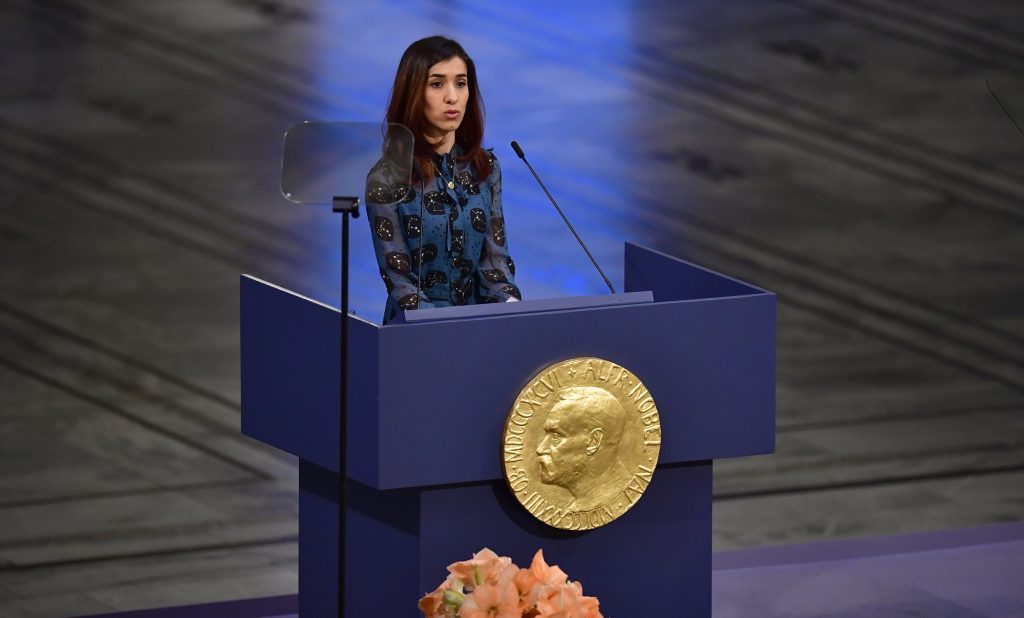
- ARAB NEWS
- 13 Jul 2025

The Nobel Peace Prize this year went to two anti-rape activists, one a victim of rape and the other a healer. The announcement of the winners came a week after the world followed live the proceedings of Judge Brett Kavanaugh’s Senate hearings regarding sexual assault accusations, ending with him being confirmed to the highest house of justice in the US.
The winners of the 2018 Nobel Peace Prize are two champions of women who are fighting sexual violence around the world. One of them was Yazidi activist Nadia Murad, who was held captive and raped by Daesh militants in Iraq, among hundreds of other women. After escaping, she courageously spoke about her enslavement and torture and dedicated herself to campaigning against human trafficking and calling on the international community to take a tougher stand on rape as a weapon of war.
The second winner was Denis Mukwege, a doctor who has treated tens of thousands of victims of rape in the Democratic Republic of Congo since the late 1990s. The vicious and barbaric acts of rape and torture of whole communities he encountered indicate the intent and purpose of these war crimes. It is something we also saw perpetrated in Myanmar against the minority Rohingya Muslims last August to force them to flee their homes and villages. In both these countries, as well as for the Yazidis, the victims are still waiting for the perpetrators to be brought to justice. But, the longer the conflicts continue, the longer it will be before that happens.
It was not until the International Criminal Tribunal for the former Yugoslavia in 1996 that rape and other forms of sexual violence were prosecuted as an international war crime. The court indicted eight Bosnian Serb military and police officers in connection with the rape of Muslim women during the war in Bosnia (1992-1994). The first time sexual violence was judged to be part of genocide was at the International Criminal Tribunal for Rwanda in 1998, four years after the genocide in which an estimated 800,000 people were slaughtered and the perpetrators systematically used rape as a weapon.
With tougher laws and implementation, as well as awareness, there can be better protection against sexual violence and harassment during both conflict and peaceful times.
In 2008, the UN Security Council voted unanimously for a resolution describing rape as a tactic of war and a threat to international security. UN Resolution 1820 noted that “women and girls are particularly targeted by the use of sexual violence, including as a tactic of war to humiliate, dominate, instill fear in, disperse and/or forcibly relocate civilian members of a community or ethnic group.” It added that “rape and other forms of sexual violence can constitute war crimes, crimes against humanity or a constitutive act with respect to genocide.”
If this is the case for victims of rape in regions of conflict, what about in peaceful, prosperous countries where there is law and order. Other factors come into play that might stand in the way of “justice,” such as politics, culture and economy. Cases of rape, sexual violence, assault and harassment are always difficult to prove because it is usually a he said, she said matter, unless there is evidence or witnesses.
These crimes are devastating for women and girls; physically, emotionally and mentally. They also affect the entire family and, in the case of war-torn regions, the whole community, for decades.
And, knowing how difficult it is to prove, especially as societies in general tend to blame and shame the woman, not the man — which damages the woman even more — many women might choose not to report being raped or seek help for being assaulted or harassed. There is also the pressure of getting and keeping a job.
This is why the #MeToo movement was such a surprise. That women finally spoke up against powerful men is a show of force that hopefully will bring a change to the mindset surrounding sexual violence in all its forms across the globe and to the idea that women must shut up or cozy up.
Sexual violence, aggression and even harassment, whether physical or verbal, are, in essence, a power play, where the person feels they are in a powerful enough position to act with impunity. Breaking the silence is crucial to holding the perpetrators accountable. Furthermore, speaking about it, as the Nobel Peace Prize winners did, would bring more attention to the victims. Research has shown that sexual assault brings with it post-traumatic stress disorder, depression, anxiety, a shattering of self-confidence and even suicide attempts. Job and academic performance suffer, as do relationships with others, particularly at the personal and intimate level.
In Saudi Arabia, a law was approved last June to combat sexual harassment, which is considered a crime according to Islamic law. It was adopted at a time when more job opportunities and greater involvement in society were opening up for women, and not long before the permission to drive came into effect. The law is meant to protect the identity of the harassed and help them come forward and report incidents. It is for all individuals who might endure harassment. Under the law, sexual harassment is defined as words or actions that hint at sexuality toward one person from another, or that harms the body, honor or modesty of a person in any way. The law also applies to modern technology, including social media.
With tougher laws and implementation, as well as awareness, there can be better protection against sexual violence and harassment during both conflict and peaceful times.
Maha Akeel is a Saudi writer. She is based in Jeddah. Twitter: @MahaAkeel1